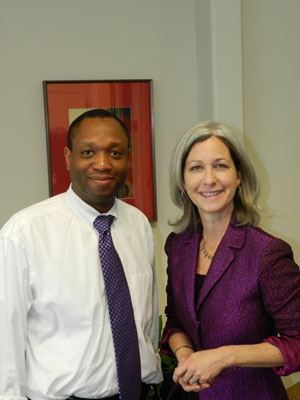
With hedge fund firms facing a federal securities fraud crackdown and an increased regulatory burden under Dodd-Frank, one Stamford fund manager says the biggest threat facing the industry may be public perception.
“It”™s been a tough two or three years for the industry,” said Guy-Max Delphin, CEO and chief investment officer of Delphin Investments L.L.C. “I don”™t think the industry has done a great PR job.”
Delphin founded the firm four years ago in hopes of offering investment products that would be distinct from those marketed by the region”™s largest hedge fund firms ”” most of which experienced losses in the aftermath of the 2008 financial crisis.
Products offered by Delphin Investments include two hedge fund strategies and a U.S. small-cap stock portfolio. The firm currently has a half-dozen employees, with Delphin saying he hopes to grow to between 15 and 20 full-time staff and interns over the next five years.
Since it launched, Delphin said the firm”™s strategies have showed strong returns, which he attributed to the ability of smaller hedge fund firms such as Delphin Investments to have more diverse product offerings than firms offering larger hedge funds or large-cap stock funds.
However, Delphin said that competing with public perception and against some of the larger fund management firms in Fairfield County has posed a challenge.
“We do understand ”¦ that the perceived risk of smaller institutions is a major hurdle,” said Delphin, who, prior to founding Delphin Investments, worked as an investment strategist for the Yale-New Haven Health System.
Frequently, he said, “Asset allocators are going to bigger shops, and smaller guys are having a tougher time. It”™s not good for the industry. ”¦ You want smaller entities that have more diverse products.”
Those smaller entities are likely to have a tougher time grappling with increased regulatory burdens, said Mark Fagan, managing partner at accounting, tax and consulting firm Citrin Cooperman”™s Norwalk office.
“They (hedge funds) are going to have to spend more money in order to comply with these requirements,” Fagan said. “If they don”™t have a compliance officer, they”™re going to have to get one.”
Fagan said that under Dodd-Frank, hedge funds “are going to have to document their procedures and policies similar to what they did with Sarbanes-Oxley ”¦ to ensure they have the controls in place and to present the information accurately. And they”™ve got to deal with additional risks within the industry itself and how the fund managers handle those risks.”
While the “mega hedge funds with billions (of dollars) under management” likely have those personnel in place already, Fagan said smaller firms will be hard pressed to meet the new requirements.
The smaller fund management firms “are run on a tight, lower level of personnel and can”™t afford to hire a highly paid compliance officer, but now they”™re going to be required to,” Fagan said.
Legal troubles facing some of the industry”™s most prominent members have likely impacted the industry as a whole as well, said Stanley A. Twardy, managing partner of law firm Day Pitney L.L.P.”™s Stamford office and a member of the firm”™s white collar and internal investigations practice group.
“Unfortunately, I do think there are hedge funds that have been negatively affected,” Twardy said. “However, there are a number of funds that do things both legally and ethically and I think that those firms ”¦ are surviving, but certainly they”™ve been impacted.”
A number of Fairfield County investment firms have been caught in the throes of what has been a multi-year, multi-agency investigation into securities fraud and insider trading.
Since 2008, U.S. Securities and Exchange Commission (SEC) investigations have targeted at least a half-dozen former employees of Stamford-based SAC Capital Advisors for insider trading activities.
In addition, Stamford-based Aladdin Capital Management and a former executive were charged Dec. 17 by the SEC with misrepresenting the firm”™s activities to investors; Stamford-based Compass Group management and its founder were charged Nov. 30 by the SEC with insider trading; Danbury-based Deer Hill Financial Group and a former broker were charged Sept. 13 by the SEC with stealing investor funds; and representatives of Stamford-based Diamondback Capital Management and of Greenwich-based Level Global Investors were charged Jan. 18 in an insider trading scheme.
The individuals in the latter four cases, with the exception of Stephen B. Blankenship of Deer Hill, have either reached settlement agreements with the SEC or have pled guilty to or been convicted of related charges brought by the U.S. Justice Department.
Twardy, who served as U.S. Attorney for the District of Connecticut from 1985 to 1991, said the recent federal investigations have proven “very successful” in pushing back against illegal trading activities.
“The fact that the government has utilized investigative techniques that in the past were used more for mobs and organized crime ”” such as wiretaps, search warrants and the like ”” that”™s a power that the hedge funds don”™t have,” he said. “They don”™t have the ability to conduct court-authorized wiretaps or electronic surveillance. They don”™t have grand jury subpoena power.”
However, he acknowledged that a few bad actors have put the entire industry under the spotlight.
Twardy likened the situation to that of Mark McGuire and Sammy Sosa, both former professional baseball players who have been accused of using performance enhancing drugs.
“Because they used PEDs, steroids, and the like, does it mean that all baseball players did?” he said. “No, but were players of that era negatively impacted by it? Yes. ”¦ Perception doesn”™t mean reality but it still exists.”


















Comments 1